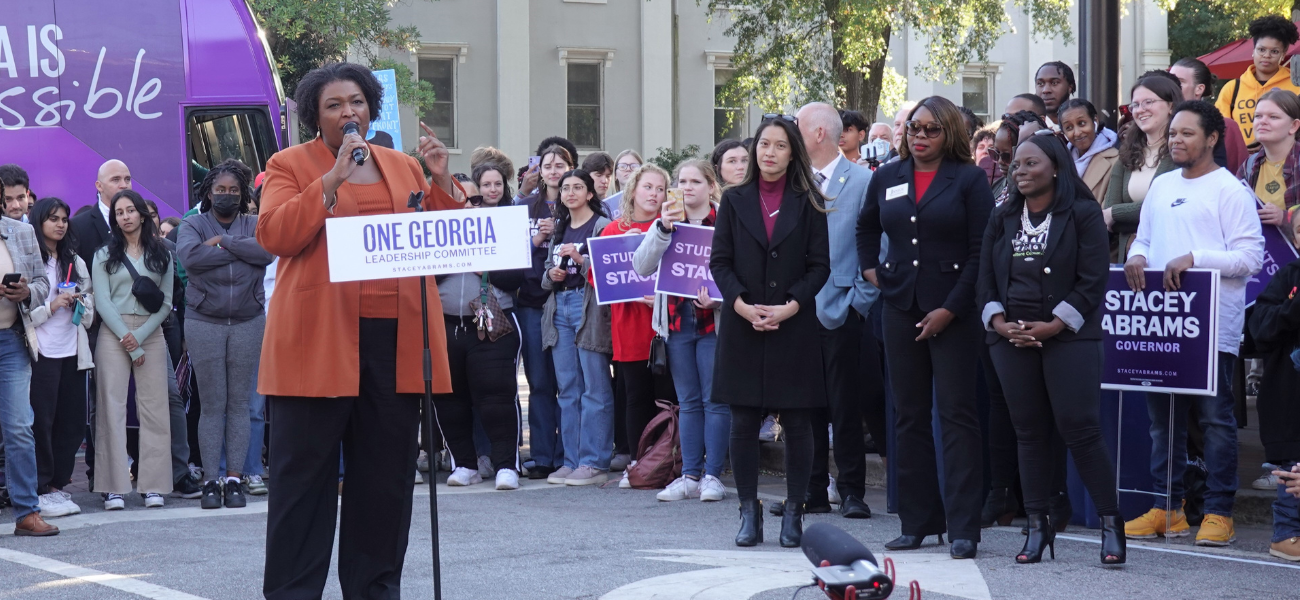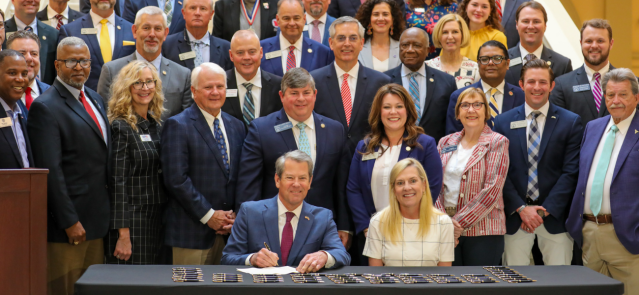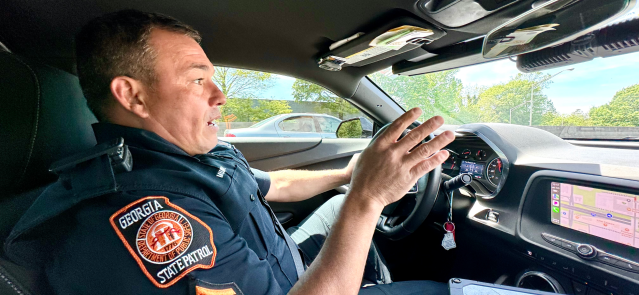Stay ahead of the curve as a political insider with deep policy analysis, daily briefings and policy-shaping tools.
Request a DemoATHENS, Ga. — The advance team of the Stacey Abrams campaign knows how to whip up a crowd. Doling out “Students for Stacey” signs to a diverse group of University of Georgia students and onlookers assembling in downtown Athens, her purple-clad staff ushered them to gather around a blocked-off spot in the middle of the street, to await the arrival of Abrams on her tour bus.
Abrams press secretary Jaylen Black, a proud University of Georgia (UGA) grad, led the crowd in a rousing series of chants, ending with a refrain of “Let’s get it done!” and invited a few students to grab the mic.
Watching from the sidewalk was Tamaine Jordan, a 43-year-old lifelong Athens resident who works in community outreach for Clarke County Public Schools. Describing himself as politically independent — though Republican-leaning of late, he said he was undecided about his vote for governor and had come to the rally because he wanted to hear what Abrams had to say face to face and not on TV, especially on the issues of homelessness and improving wages for people in Georgia.
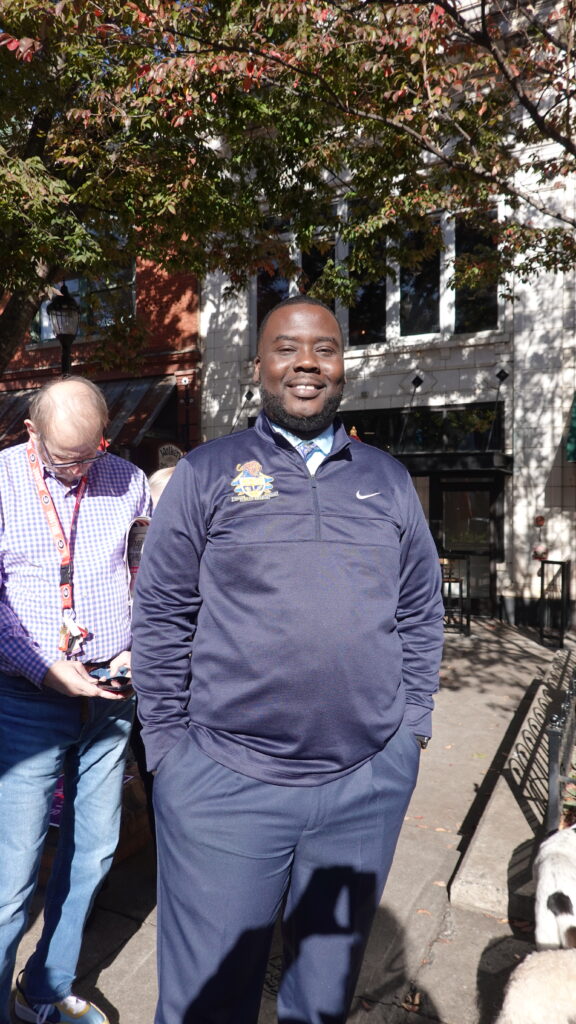
Jordan, who is Black, said he’s been “a constituent” of Gov. Brian Kemp, a fellow Athens native, for years. He said he got to know Kemp casually while serving him as a waiter and bartender at the 76-year-old, members-only Athens Country Club. Jordan said he appreciates Kemp’s moves to “put us back to work right after COVID, which really helped to sustain the Georgia economy.”
The purple-wrapped bus (Abrams’ signature color) arrived and Abrams stepped off, joining an entourage that included Athens Mayor Kelly Girtz.
Secretary of State candidate Bee Nguyen spoke ominously about voter suppression in Georgia, pointing to SB 202, also known as the Election Integrity Act of 2021. “They do not want us to vote!” she warned.
After hearing from other female candidates on the ballot next week, Abrams took the mic. She spoke with fiery passion about her agenda as the next governor of Georgia, including plans to divvy up the $6.6 billion fiscal year 2022 surplus to expand Medicaid coverage to an additional half million Georgians, which she said would also create 64,000 new jobs in the state. She promised to spend more on housing and public education. And she criticized Kemp’s support of the concealed carry gun law he signed this year.
“What if we didn’t have to be worried about gun violence taking our families and ruining our communities? What if we had the right to control our bodies as women?” she asked. “We deserve a governor who sees us, who serves us, who will help us to be our best selves!”
A week later, Jordan said he was impressed by what he saw and heard at the Athens rally.
“It was electrifying,” he said. “Those women came with excitement. When they got off the bus and waved their hands, it was like, ‘Wow!’ And then they grabbed the mic and spoke with power. It really did it for me. Being an African-American male raised by an African-American woman, I see the power in the minority — and with all of them working together, I think they could change the perspective of Georgia and America, and really make a difference.”
Jordan said he liked the solutions offered by Abrams on health care and affordable housing. “And she reminded me it was Kemp who reduced the regulations on gun licensing and purchasing. That doesn’t sit well with me. We have so much crime here. Just this weekend three young men under 20-years-old were shot here in Athens. I’d like to see some new leadership with a different perspective come in and shake things up.”
Asked about his current choice for governor, he replied, “Well, let’s just say I’m a strong, strong, strong Stacey Abrams supporter now.”
Stacey and the Fellas and the Gender Gap
That undecided voter conversion outcome might just be the dream scenario for the Abrams campaign, which is working hard to connect with Black voters, particularly Black men.
Abrams has made a point of declaring that she can’t win without the Black male vote.
“If Black men vote for me, I will win Georgia,” she said during an event at a restaurant in Kennesaw this past August. The gathering, hosted by popular radio DJ Frank Ski, was one of her “Stacey and the Fellas” campaign events held this year, aimed at helping her connect with Black men.
But current polling numbers paint a bleak picture for her ambitions. Abrams has lost traction in the polls since August, when she was trailing Kemp by 3.5 points. Now she’s behind Kemp by 7 points (51% to 44%) in the latest Atlanta Journal-Constitution (AJC)/UGA poll released this week, and losing by almost 8 points in recent two-week polling averages tracked by Real Clear Politics.
The Black male voters she’s pursuing traditionally represent the second largest and most faithful voter block, behind Black women, for Democratic candidates in Georgia. In voter surveys and exit polls, Abrams consistently places lower with Black men than with Black women.
Bloomberg noted that when Abrams lost to Kemp in 2018 by 55,000 votes, “exit polls found that 97% of Black women had voted for Abrams, compared with 88% of Black men. That nine-point gender gap represented 120,000 votes.”
More recently, in a September 2022 AJC/UGA poll, 79% of Black respondents said they planned to vote for Abrams, including 82% of Black women and 74% of Black men, prompting concern that she was losing support from Black men.
Her campaign staff argued at the time that the AJC poll skews Republican.. In the latest October AJC/UGA poll, where Kemp won 51% of all likely voters, 50 percent of respondents in the poll identified as GOP voters, 41 percent as Democrats, and 9 percent as Independents.
Overall, 87% of Black voters supported Abrams in the October poll, an 8 percent increase since September.
“The Black vote is going to continue coalescing around Abrams, including Black men,” says Trey Hood, a professor of political science at UGA who conducts the AJC poll. “Black support for Democratic candidates will be 90 to 95 percent, as it has been for the last several decades. It will be big news if there’s a divergence from that pattern.”
His UGA colleague Charles Bullock, a professor of political science, notes that closing the gender gap is a challenge for any female candidate.
“It’s a gap that you find between men and women voters within all ethnic groups. Women are more likely to be Democratic than men; that’s part of it. The other part in the governor’s race is that some Black men are pleased with what Kemp has been able to do with the economy. Our unemployment — currently less than 3 percent — that probably translates into better pay. “
But Abrams’ biggest challenge is that she’s running against an incumbent, says Bullock. “Four years ago it was an open seat. And now Kemp’s got a record and there are elements of his record that are broadly popular.”
Bullock notes that Republicans and many business owners “are glad that Kemp opened up the state very quickly after COVID closed things down. Lots of people are very happy to get those [tax] refund checks. He has bragging rights on the Hyundai and Rivian [automotive] plants that have come to Georgia, bringing new jobs. And he connects the dots and says, ‘It’s because I’ve created such a positive environment for business.’ A lot of things that have happened on his watch that he takes credit for have won him some independent voters, and he’s even picking up some Democratic voters.”
Count Sultan Karim among them.
The 48-year-old barber says his shop in East Lake would have likely gone under if not for Kemp’s decision to reopen the state for business early on in the pandemic.
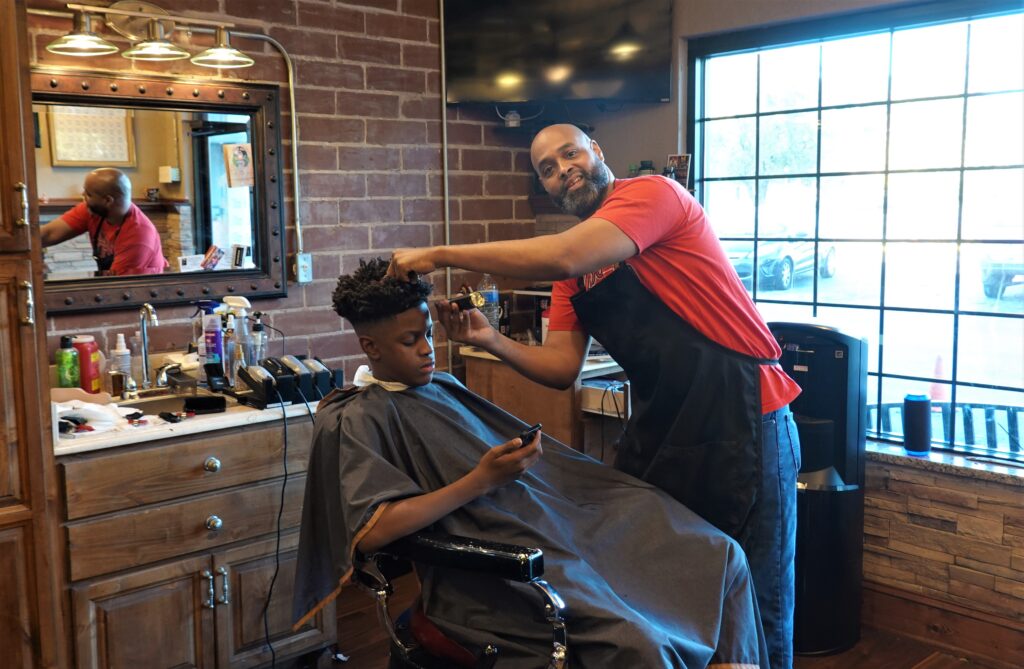
While he voted for Abrams in 2018, he says Kemp “has done a good job with the economy.
“And he ain’t scared to get out of the car with Trump, with that voter fraud fiasco. He’s showing me that he’s a shrewd politician. Why would I vote for Stacey — just because she looks like me? If she walked in right now, I’d kiss her on the face — but Kemp has shown me he’s a good governor.”
Karim added, “I see voting as a quid pro quo. If I vote, I should get something. Kemp did me a solid two years ago. So he’s already paid. If and when I vote, I’ll return the favor.”
Pursuing New and Unlikely Voters
Abrams campaign staff says its strategy has been to expand the electorate overall, in part by pursuing younger voters and people of color and reengaging inactive voters. That includes taking aim at the 400,000 of the state’s 1.2 million registered Black male voters who have opted out of voting in the past five election cycles.
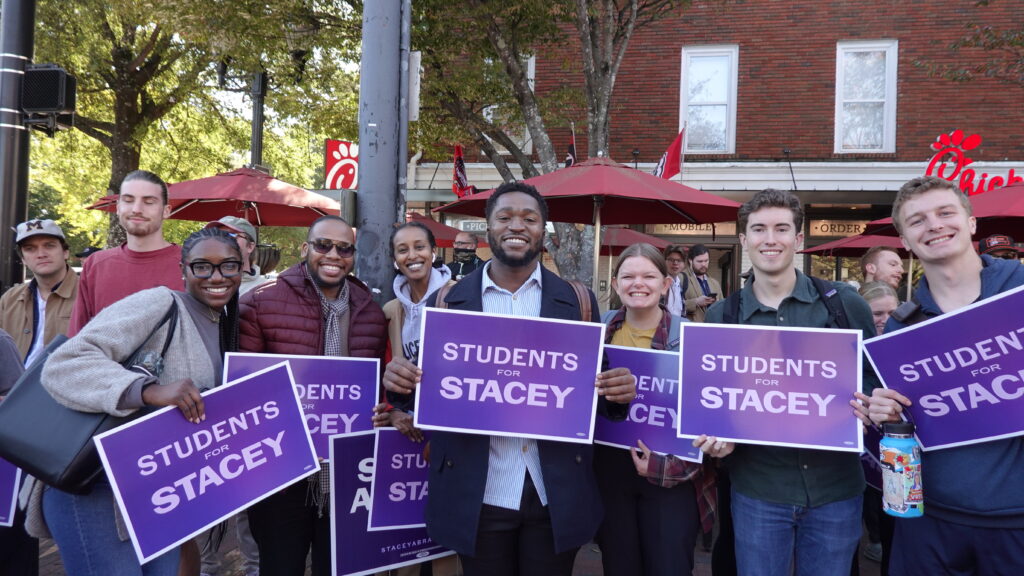
The Georgia electorate is certainly bigger and more diverse since Abrams ran four years ago. Since 2018, 1.6 million new voters have registered to vote in Georgia, and they now represent 20 percent of the total 7.7 million registered voters in the state, according to data from the AJC. People of color, voters under the age of 35 and urban voters number among the demographic groups that have shown the largest increases. Those voter groups tend to favor Democrats.
Not surprisingly, Abrams scoffs at the polls showing her losing to Kemp by a seemingly insurmountable margin, calling them a “snapshot” of voters that doesn’t capture the changes in the electorate.
Bullock says Abrams “can take some solace when looking at the polling, which shows her down 6, 8, 10 points and saying, ‘Well, what they’re doing is polling likely voters, and what I’m trying to do is to get unlikely voters to the polls, and they’re not being tapped.’ And it’s true,” Bullock said. “Who they’re polling now are individuals who voted in the primary or in the last election cycle. So if she’s succeeding at getting some of these new voters in Georgia, these 1 million-plus folks who have signed up to vote since 2020, maybe she can overcome the gap that we see.”
On the Road Again
In the closing weeks of her campaign, Abrams has embarked on a bus tour all over Georgia, holding rallies in urban and rural areas. Besides the slate of women Democrats who often flank her at these events, which also includes attorney general candidate Jen Jordan, she’s enlisted the support of some high-wattage stars.
Actors Kerry Washington and Lin Manuel-Miranda appeared with her and revved up supporters to vote early at events in Stone Mountain and Atlanta, where rapper and actor Common joined Democratic canvassers to knock on doors. Abrams popped on stage briefly with hip hop stars Lizzo and Latto to say, “I’m not gonna interrupt your fun. I just want to remind you that if you believe in my body, my choice, I need your vote, I need your big energy.”
Abrams did a short rap during a live taping of the “Questlove Supreme” podcast in Atlanta, followed by a serious discussion with musician Questlove about police misconduct, generational poverty and Kemp’s role in disenfranchising Black voters. Questlove called Abrams “the human being I credit for holding our democracy in place.”
Abrams also had a cozy virtual confab with media mogul Oprah Winfrey, who oozed support of her candidacy during their split-screen conversation.
Abrams said, if she is not elected, “Our children will continue to go to underfunded schools where transgender children have been banned from playing with their friends. We will have divisive laws that say that you have to lie to your children about their history. The members of the LGBTQ community will not have protection.” She told Oprah that Kemp “has proven he doesn’t care, and he won’t help,” and if elected “will attack our freedoms, especially if you’re a woman.”
Winfrey asked rhetorically, “What can we do to help? And the biggest answer is, you vote, because too much is at stake not to.”
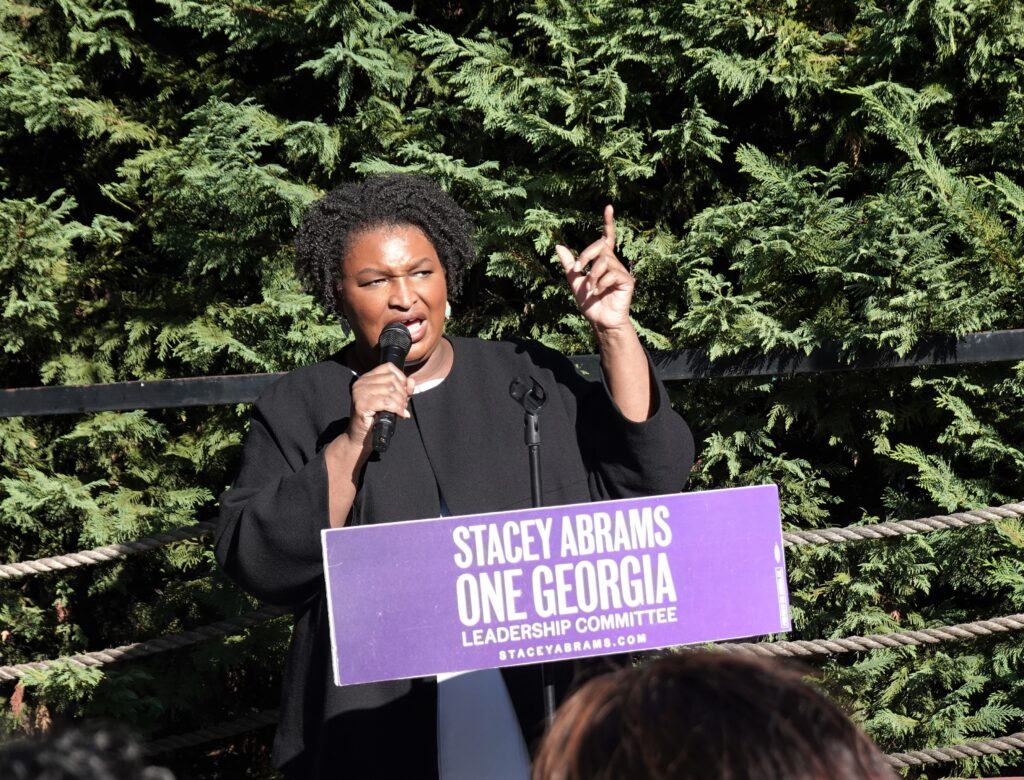
Earlier that day, Abrams spoke to a group of mostly Black supporters at a barbecue joint in a working class neighborhood of College Park. In addition to laying out her sweeping platform of Medicaid expansion, subsidizing affordable housing, repealing the six-week abortion ban, and investing in public schools, she vowed to be “the Maynard Jackson of Georgia,” doling out pieces of state contracts to small business owners and people of color, whom she said currently get only 1.5 percent of such contracts. She also pledged to make technical college tuition free, to provide paid apprenticeship opportunities for college students, and to create a $10 million small business investment fund. Many heads nodded in approval, and joined Abrams in her closing call-and-response routine: “More Money! More Opportunity! More Freedom!”
Her messaging lands well at her rallies, but Abrams is encountering some interference from both expected and unlikely sources.
Kemp and his supporters routinely call her “Celebrity Stacey” and try to link her to currently unpopular President Joe Biden (who has a 37% approval rating in conservative-leaning Georgia), high inflation rates, and “liberal Hollywood elites,” as with this campaign ad featuring the image of Abrams as President of Earth from her cameo in a recent “Star Trek: Discovery” episode.
After her appearance with Winfrey, Kemp spokesperson Tate Mitchell said, “While Stacey Abrams continues to solicit the help of out-of-state billionaires, Gov. Kemp will continue to talk to hardworking Georgians about his record of economic success and plan to build a safer, stronger Georgia.”
Atlanta’s conservative Black radio host Shelley Wynter regularly retweets Kemp’s messages and digs at Abrams. Recently he has faulted Abrams for telling CNN she would not defund the police, but “reallocate resources from the police departments into community resources,” which he says “is the same thing.” Meanwhile, Abrams has also said she would raise the salaries of some law enforcement officers and expand mental health training for officers if elected.
And then there’s pop icon Killer Mike.
The blunt-talking Atlanta rap star and activist was famously Democratic Atlanta mayor Keisha Lance Bottom’s go-to peace maker in 2020, the day after George Floyd’s murder at the knee of Minneapolis police set off angry protests, looting and destruction in Atlanta and nationwide. On live TV, he urged people to go home and “plot, plan, strategize and mobilize” to “beat up the politicians you don’t like” in the next election.
Some feel that Killer Mike, whose real name is Michael Render, is now beating up on Abrams. Last month, he appeared on Comedy Central’s “Helluva Week with Charlemagne the God” show and praised Kemp for attending a gathering of conservative Black businessmen in Atlanta. His advice to Abrams: “Whatever white person you got running your Black outreach, fire them … You need to go everywhere Brian Kemp just went, because what Kemp just did was have an effective week with Black people.”
While Killer Mike has since insisted on Twitter that he’s “making no public endorsements” and will keep his voting preferences private, his rhetoric of late has infuriated many Black people and progressive Democrats.
That includes Black Voters Matter co-founder LaTosha Brown, whose Atlanta-based organization is working to engage and mobilize Black voters in Georgia and all over the South.
“What Killer Mike has been saying is damaging and misleading,” says Brown. “He framed in some way that Brian Kemp is stronger than Stacey Abrams on economic issues by connecting him with Black business. Well, where was Brian Kemp for the last four years when he could have gotten contracts for Black businesses? Although the state is 30 percent African-American, why is it that under his watch Black businesses only received one percent of state contracts?” Brown also observes that sexism is at play in Abrams’ failure to win over some Black male voters.
“Are there some Black men who may have issues with her because she’s a woman? Absolutely. Sexism is historically present in our community and even more so in the white community. We saw this with Hillary [Clinton]. I always say that racism is nonpartisan, and sexism is nonracist, so it’s across the board. And as a Black woman, Stacey has to navigate across racism and sexism.”
Reading the Turnout Tea Leaves
Last summer, Kemp announced plans to return $2 billion of Georgia’s $6.6 billion fiscal year 2022 surplus in the form of tax rebates to Georgia residents and to help local governments reduce homeowners' property taxes. Abrams pledged to invest $1 billion in tax rebates and to invest the rest in infrastructure and an array of services.
Abrams received high praise for her plans from perhaps the most popular Black man in America last Friday when former President Barack Obama appeared with Abrams, incumbent U.S. Senator Raphael Warnock and other top Democratic candidates before 7,000 excited Atlantans at a rally inside a College Park convention center.

“What Stacey Abrams is obsessed with … is making sure every Georgian has an opportunity to get ahead,” said Obama. “She’s investing Georgia’s surplus in the fundamentals: Good schools, a higher standard of living, more affordable health care and housing. That’s her agenda.”
Early voting numbers, by mail-in ballot and in-person voting, have continued to break records on an almost daily basis since voting started Oct. 14. As of Nov. 2, some 2.1 million people in Georgia had voted, a turnout 25% higher than at this time last year. Black voters currently represent 29.1% of votes cast, a percentage almost equal to their share of registered voters in the state.
Operatives of all political parties are picking apart the early voter data to predict success or failure for their candidates and opponents.
UGA’s pollster and political scientist Hood cautions against this, as “it’s not really reliable data to project from.
“We typically know that Democrats and African-Americans like to vote early and in person. Republicans tend to vote more often on election day. So we won’t really know where things stand until election day,” said Hood, adding that a more reliable metric might be the 30/30 rule.“If overall turnout is 30 percent Black, and a Democrat can get 30 percent of the White vote, then a Democrat has a good chance of winning,” he says.
Want to participate in the conversation? Share your thoughts on social media:
Twitter @STATEAFFAIRSGA
Facebook @STATEAFFAIRSUS
LinkedIn @STATE AFFAIRS
Contact Jill Jordan Sieder at [email protected] or on Twitter @JOURNALISTAJILL.
Read this story for free.
Create AccountRead this story for free
By submitting your information, you agree to the Terms of Service and acknowledge our Privacy Policy.
Kemp signs bills on education, health care, taxes
Gov. Brian Kemp signed a slew of bills over the past week or so, including the private school voucher bill long sought by Republicans and a bill that will ease regulations over the construction and expansion of medical facilities in rural areas.
His bill-signing events were clustered into themes: education, health care, military members, human trafficking and Georgia’s coastal communities.
Education
Among the education-related bills Kemp signed was Senate Bill 233, also known as the Georgia Promise Scholarship Act, which provides the families of Georgia students enrolled in underperforming school districts with $6,500 scholarships that can be used toward private school or homeschooling expenses, including tuition, fees, textbooks and tutoring.
“Georgia is affording greater choice to families as to how and where they receive their education, while also continuing our efforts to strengthen public schools, support teachers, and secure our classrooms,” Kemp said, and thanked leadership in the House and Senate for prioritizing passage of the bill, which had failed in a close vote in 2023.
Democrats and many public education advocates who opposed the bill argued it will drain resources from public schools and primarily benefit students from wealthy families.
Kemp also signed Senate Bill 351, sponsored by nine Republican senators, which will require social media companies, as of July 1, 2025, to verify their users are at least 16 years old unless they receive approval from a parent.
House Bill 409, sponsored by Rep. Lauren Daniel, R-Locust Grove, directs school systems to consider not having bus stops where a student would have to cross a roadway with a speed limit of 40 mph or greater. The bill also increases the penalty for passing a stopped school bus to $1,000 from $250.
Kemp noted that Ashley Pierce, the mother of Addy Pierce, an 8-year-old who was fatally struck by a motorist as she boarded her school bus, “passionately advocated for and was instrumental in the passage of this legislation.”
Senate Bill 395, sponsored by Sen. Clint Dixon, R-Gwinnett, states that no school visitor or personnel can be prohibited from possessing an opioid reversal drug such as Narcan and directs schools to maintain a supply. It also allows opioid antagonists to be sold in vending machines and directs certain government buildings to maintain a supply of at least three doses.
Senate Bill 464, also sponsored by Dixon, creates the School Supplies for Teachers Program to financially and technically support teachers purchasing school supplies online. It also creates an executive committee of five voting members within the Georgia Council on Literacy and limits the number of approved literacy screeners to five, one of whom must be available to schools for free.
Health care
The governor chose his hometown of Athens as the venue to sign several bills aimed at improving health care in rural and underserved communities.
Among them was House Bill 1339, sponsored by Rep. Butch Parrish, R-Swainsboro, which revises the Certificate of Need process by which the state determines if and how new medical facilities can be built or expanded. The bill provides for several new exemptions, including psychiatric or substance abuse inpatient programs, basic perinatal services in rural counties, birthing centers and new general acute hospitals in rural counties. It also raises the total limit on tax credits for donations to rural hospital organizations to $100 million from $75 million.
Senate Bill 480, sponsored by Sen. Mike Hodges, R-Brunswick, establishes student loan repayments for mental health and substance use professionals serving underserved youth in the state or in unserved geographic areas disproportionately impacted by social determinants of health.
House Bill 872, sponsored by Rep. Lee Hawkins, R-Gainesville, chair of the House Health and Human Services Committee, expands cancelable loans for certain health care professionals to dental students who agree to practice in rural areas.
Senate Bill 293, sponsored by Sen. Ben Watson, R-Savannah, chair of the Senate Health and Human Services Committee, reorganizes county boards of public health and opens the qualifications for the CEO of each county board of health to include either licensed physicians or people with a master’s degree in public health or a related field.
Military members and veterans
Kemp on Wednesday focused on bills to improve military recruitment and provide more work opportunities for veterans and military family members.
House Bill 880, sponsored by Rep. Bethany Ballard, R-Warner Robins, allows spouses of military service members to work under a license they hold in good standing in another state while under the supervision of an existing Georgia medical facility or provider.
Senate Bill 449, sponsored by Sen. Larry Walker, allows military medical personnel to practice for 12 months while a license application is pending, including working as a certified nursing aide, certified emergency medical technician, paramedic or licensed practical nurse. The bill also creates a new advanced practice registered nurse license and makes it a misdemeanor to practice advanced nursing without a license.
Human trafficking
The governor on Wednesday was accompanied by first lady Marty Kemp and other members of the GRACE Commission for the signing of an anti-human trafficking package. It includes Senate Bill 370, which adds certain businesses to the list of organizations that must post human trafficking notices, including convenience stores, body art studios, businesses that employ licensed massage therapists and manufacturing facilities.
Sponsored by Sen. Mike Hodges, R-Brunswick, the bill also allows the Georgia Board of Massage Therapy to initiate inspections of massage therapy businesses and educational programs without notice and requires massage therapy board members to complete yearly human trafficking awareness training.
House Bill 993, sponsored by Rep. Alan Powell, R-Hartwell, creates the felony offense of grooming of a minor and creates new penalties for offenses relating to visual mediums depicting minors engaged in sexually explicit conduct.
House Bill 1201, sponsored by Rep. Houston Gaines, R-Athens, allows human trafficking survivors who received first offender or conditional discharge status to vacate that status for certain crimes, as long as the crime was a direct result of being a victim of human trafficking.
Coastal communities
Earlier today in Brunswick, Kemp signed legislation impacting Georgia coastal communities, including House Bill 244, which amends the laws around how wild game can be hunted and how seafood dealers operate, and House Bill 1341, which designates white shrimp as the state’s official crustacean.
Taxes
Earlier this month Kemp signed several bills related to taxation, including House Bill 1015, sponsored by Rep. Lauren McDonald, R-Cumming, which lowers the state income tax for tax year 2024 to 5.39%, accelerating a multiyear drop in state income taxes that started at 5.75% in 2023 and will continue through 2029.
The Governor’s Office of Planning and Budget estimates the tax cut acceleration will save Georgia taxpayers approximately $1.1 billion in calendar year 2024 and about $3 billion over the next 10 years.
Kemp also signed House Bill 1021, sponsored by Rep. Lauren Daniel, R-Locust Grove, which increases the state’s income tax dependent exemption to $4,000 from $3,000.
House Bill 581, sponsored by Reps. Shaw Blackmon, R-Bonaire, and Clint Crowe, R-Jackson, enables a constitutional amendment (House Resolution 1022) to let voters decide whether counties can provide a statewide homestead valuation freeze, which limits the increase in property values to the inflation rate.
The governor has until May 7 to sign or veto bills passed during the legislative session that ended on March 28. Those he takes no action on will automatically become law.
Legislation signed by Kemp is posted on the governor’s website.
Read these related stories:
Have questions, comments or tips on education in Georgia? Contact Jill Jordan Sieder on X @journalistajill or at [email protected].
Facebook @STATEAFFAIRSGA
Instagram @STATEAFFAIRSGA
LinkedIn @STATEAFFAIRS
Incumbent candidates for local, federal races likely to be no-shows at this weekend’s primary debates
ATLANTA — One of Georgia’s prominent media organizations is pleading with incumbent state and congressional candidates to participate in its primary election debates slated for Sunday.
For the first time in The Atlanta Press Club’s 30-year debate history, incumbents facing challengers in the May 21 primary have either declined or not yet committed to participating in the organization’s well-known debate series. The possible no-shows include candidates in four Congressional races as well as the Georgia Supreme Court, and the Fulton County District Attorney races.
“This is the first time that we’ve had so many [incumbents] not participate,” debate organizer Lauri Strauss told State Affairs. Strauss declined to speculate why candidates aren’t participating.
Hoping to encourage more participation, the organization issued the following statement:
“The Atlanta Press Club believes it is the responsibility of people running for public office to answer questions from their local media that will help inform voters before they cast their ballots. If a candidate is running for public office, the candidate should be willing to participate in the democratic process, which includes attending debates and fielding questions from journalists and opponents.”
Candidates have until Friday to RSVP.
Strauss said candidates who fail to appear will be represented on stage by an empty podium during the debate.
District Attorney Fani Willis has declined to participate and Democratic U.S. Reps. Lucy McBath and David Scott have yet to RSVP. Strauss said the organization is still in talks with Georgia Supreme Court Justice Andrew Pinson’s staff about his appearance in the debate.
Willis, declined earlier this week to participate, citing constraints around talking about sensitive cases like the criminal prosecution of former President Donald Trump.
McBath currently represents the 7th Congressional District and is now running in the newly drawn 6th Congressional District against two Democratic challengers, Jerica Richardson and Mandisha Thomas. McBath declined to participate in the press club’s general election debate in 2022, forcing her Republican challenger Mark Gonsalves to debate with an empty podium. McBath won with 61% of the vote.
The debates will air live on April 28 on GPB.org, on The Atlanta Press Club’s Facebook page (www.fb.com/TheAtlantaPressClub). It will be rebroadcast in early May on WABE.org.
| Race | Tape and Livestream Sun. April 28 |
GPB-TV Broadcast | WABE Broadcast |
| Congressional District 6 Democrats | 10:00 a.m. | April 29 at 7:00 p.m. | May 1 at 4:30 p.m. |
| Congressional District 13 Democrats | 11:15 a.m. | April 28 at 4:00 p.m. | May 1 at 5 p.m. |
| Congressional District 3 Republicans | 1:00 p.m. | April 28 at 5:00 p.m. | May 2 at 3:30 p.m. |
| Congressional District 2 Republicans | 3:00 p.m. | April 29 at 5:00 p.m. | |
| Georgia Supreme Court | 4:45 p.m. | May 2 at 4:30 p.m. | |
| DeKalb County CEO | 5:45 p.m. | May 2 at 5:15 p.m. | |
| Fulton County District Attorney | 6:45 p.m. | May 1 at 4 p.m. |
Have questions or comments? Contact Jill Jordan Sieder on X @journalistajill or at [email protected] and Tammy Joyner on X @lvjoyner or at [email protected].
And subscribe to State Affairs so you do not miss an update.
X @StateAffairsGA
Instagram@StateAffairsGA
Facebook @StateAffairsGA
LinkedIn @StateAffairs
‘It is nothing short of insane:’ Bill to criminalize squatting signed by governor
ATLANTA — Today Gov. Brian Kemp signed legislation criminalizing squatting, the illegal practice of entering and residing on someone else’s property without their consent.
The Georgia Squatter Reform Act makes squatting a misdemeanor criminal offense, punishable by up to a year in jail, a $1,000 fine, or both. It also speeds up the timeline to evict a squatter, giving landlords and law enforcement more tools to establish that someone is trespassing and to demand that they leave.
“It is nothing short of insane that there are some who are entering other people’s homes and claiming them as their own,” Kemp said in a post on X after signing the bill at the state Capitol. “Thanks to our legislative partners, I was proud to sign HB 1017 — once again making it clear that illegal squatters are criminals, not residents.”
Over the past few years, squatting has become more prevalent in Georgia, with trespassers breaking into vacant homes, claiming tenancy and refusing to leave.
A 2023 survey of institutional investors in single-family rental homes who are members of the National Rental Home Council found there were 1,200 illegally-occupied homes in and around Atlanta. Realtors told State Affairs they’ve encountered squatters in homes for sale and rent in Gainesville, Valdosta and Albany.
Until now, law enforcement in many jurisdictions treated the issue as a civil matter, telling property owners to file eviction actions in court, which could take months or even years to resolve.
The new law directs local law enforcement to issue citations and arrest people accused of squatting if they don’t provide a valid lease or proof of payment within three days. If they do produce such documents, it moves eviction proceedings to magistrate courts, and requires cases to be heard within seven business days after filing.
If the judge deems documents they present to be forged or fake, those accused of squatting could be charged with a felony. And judges can impose more fines based on the fair market value of rent that landlords lose.
On hand in the governor’s office for the signing was Rep. Devan Seabaugh, R-Marietta, the lead sponsor of the bill.
“Currently in Georgia law, we’re giving squatters tenant rights,” Seabaugh previously told State Affairs. “And my bill would take that away. It basically says, ‘You’re an intruder, you’re a criminal, and we’re going to treat you like a criminal.’ ”
Read these related stories:
Have questions or comments? Contact Jill Jordan Sieder on X @journalistajill or at [email protected]
And subscribe to State Affairs so you do not miss an update.
X @StateAffairsGA
Instagram @StateAffairsGA
Facebook @StateAffairsGA
LinkedIn @StateAffairs
State troopers are stretched to fight drugs and curb highway deaths
ATLANTA — When Cpl. Anthony Munoz straps on his bullet-proof vest each day and pulls out of the Department of Public Safety headquarters in Atlanta, Munoz never knows how his shift will unfold. What is for certain is that the traffic — of cars, criminals and contraband — is constant.
And what is also true is that there are not nearly enough state troopers on the road to catch them all.
A 13-year veteran, trooper Munoz, 45, is part of the department’s Criminal Interdiction Unit, whose main focus is suppressing the robust illegal drug trade flowing through Georgia. Last year the eight-member team made 1,309 arrests, including 76 felony drug arrests, and helped other agencies seize $24 million worth of contraband.
In 2019, the unit had 25 members.
Capt. Greg Shackleford, the troop commander, said that in 2020 the unit was split up and half the team was sent to Georgia State Patrol posts around the state, which were hurting for staff, to conduct the Department of Public Safety’s core functions — traffic enforcement and responding to car crashes.
The split has translated into Munoz and the rest of his team now spending most of their time monitoring Interstate 20 just south of Atlanta, and Interstate 75/85 west of the city. He said they regularly support the investigations and busts of other local and federal agencies, and frequently join the governor’s crime suppression details, which have included taking down car thieves and street racers.
All this leaves his team with less time to develop intelligence on their own drug cases and to snare more traffickers. It also means the troopers no longer have time to monitor roads in rural areas in south Georgia where, Shackleford said, many drug traffickers driving trailers full of drugs and contraband enter the state on highways coming from Florida and Texas and now ride around unchecked for hundreds of miles.

Chronically understaffed
The Georgia State Patrol remains chronically understaffed. While the state’s population has grown, and with it the number of motorists, car crashes and criminal activity, the number of state troopers has hovered stubbornly between about 750 and 850 for over a decade, giving Georgia the unwanted distinction of having lowest number of troopers per capita in the country.


The average number of state troopers per capita in the U.S. is 21; for Georgia, it’s eight. And the outlook for changing that is not great, Col. William “Billy” Hitchens, the public safety commissioner, told legislators during hearings last fall — Unless the state makes bold moves in improving compensation. He said Georgia State Patrol has “aimed to reach 1,000 troopers for as long as I have been employed,” which is 30 years.
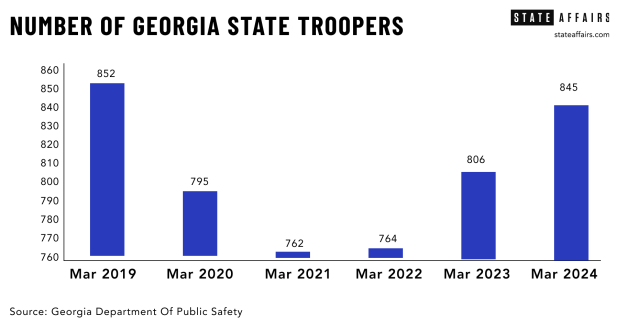
The state saw its trooper numbers plummet to 745 during the pandemic in 2021. The agency is now back to 845 troopers. The current trooper school started with 61 candidates, and if recent history is a guide, about 70% will graduate in September and put on the badge.
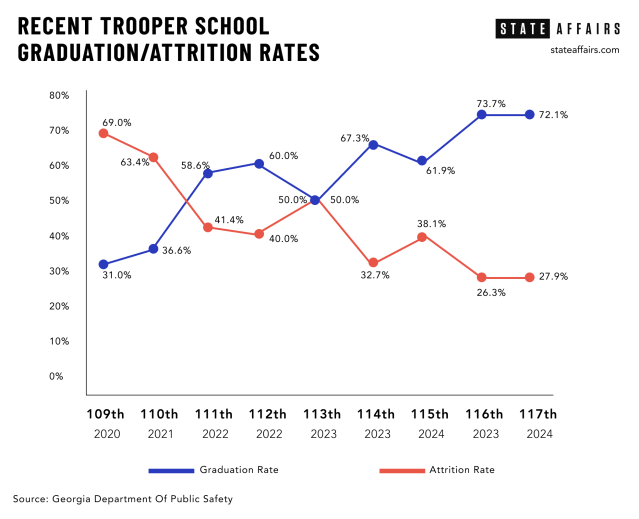
While “things are moving in the right direction” this year in terms of recruitment, said Hitchens, he said too many veteran officers are either resigning or retiring early.
Between 2018 and 2023, 48 troopers left the agency on a full-service retirement, meaning they had served for 30 years. During the same period, 341 troopers resigned, retired early or departed for other reasons. As it costs the department $153,397 to train a trooper, those who left early cost the state $52 million, said Lt. Col. Josh Lamb, director of administrative services for the Department of Public Safety.
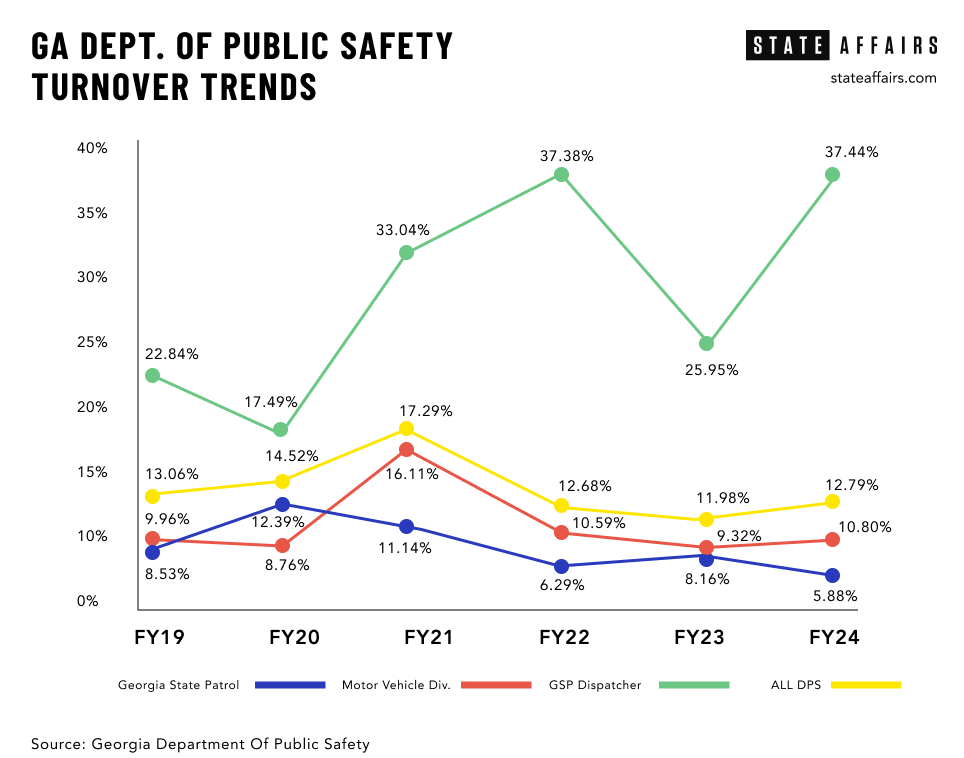
Fewer troopers means more highway deaths
Fewer troopers on the state’s roads impact everyone, say law enforcement officials. .
“As our trooper strength decreases, traffic fatalities increase,” said Hitchens.
National Highway Traffic Safety Administration data shows a direct inverse relationship between trooper staffing and the number of fatalities in Georgia. At its low ebb in 2021, with 769 troopers, 1,925 people died on Georgia roads. More recently, in 2023, with 820 troopers, Georgia saw 1,647 fatalities, an 8% decrease over 2022.
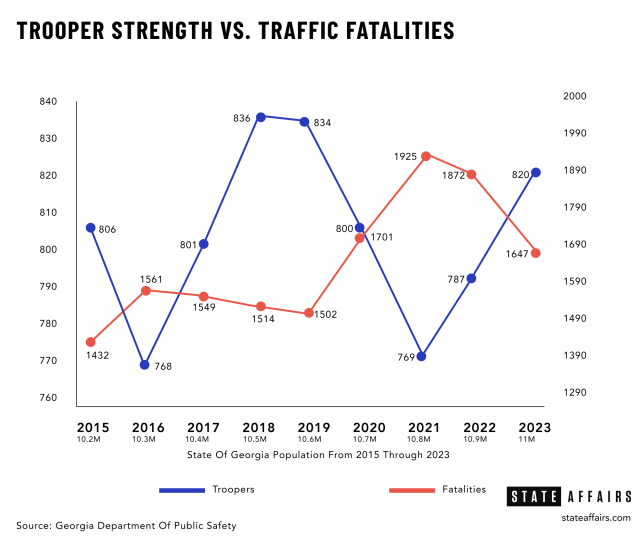
“We are concerned with traffic patterns, the way people drive, and we enforce the law out there,” Hitchens told State Affairs. “When you start losing personnel, whether it’s the state, or cities and counties, one of the first things that may be taken away is traffic enforcement. Because they’re responding to other calls — robberies, domestics, you name it. And when troopers stop doing it, there are just fewer people out there reminding you, ‘Hey, that’s dangerous. Slow down.’ ”
The state patrol wrote 408,574 citations to motorists last year, but issued even more warnings — 510,265. Hitchens noted that mere trooper presence on the highway is a strong deterrent.
“It doesn’t have to be you that gets stopped,” he said. “Those 50 cars that ride by during that time and see that patrol car, go ‘Ooh, I don’t have my seatbelt on … I’m playing with my phone,’ and it just impacts that behavior. But the less officers you see on the road, the less you have people changing their driving behavior.”
Along with encouraging safer driving, DUI enforcement has become a higher priority for the department. A “Nighthawks” squad of 22 officers patrols after midnight in areas of the state where data analysis shows high incidences of alcohol and drug-induced crashes and violations. The state patrol made 16,409 arrests for driving under the influence in 2023.
Hitchens said the work of such special units is compromised when they’re pulled into other duties due to statewide manpower shortages. The three Nighthawks units, for example, are often pulled into other traffic stops and crime suppression details in Atlanta, Macon and Columbus. And drug interdiction officers have had to cover vehicle crashes and multiple public protests over the Atlanta Public Training Center (dubbed “Cop City”) and, more recently, conflict between Israelis and Palestinians in Gaza.
Besides securing troopers, Hitchens said the department is struggling to recruit dispatchers, who are the lifeline for troopers and officers who patrol alone and depend on dispatchers to provide critical information quickly. Today, the department has 129 dispatchers who work at nine regional call centers. They need 169 to be fully staffed.
A tough sell in the ‘Cop City’ era
Hitchens told lawmakers that heightened public criticism of law enforcement over the past few years has played a role in the department’s ongoing challenges to recruit and retain officers.
“People without understanding of what it’s like to be involved in a rapidly evolving life and death situation started scrutinizing officers, cities started defunding their police departments while demanding greater accountability and more training, both of which cost money,” he said. “Following the George Floyd, Rayshard Brooks and Breonna Taylor instances, the media and some leaders in our community nationwide began to demonize the police.”


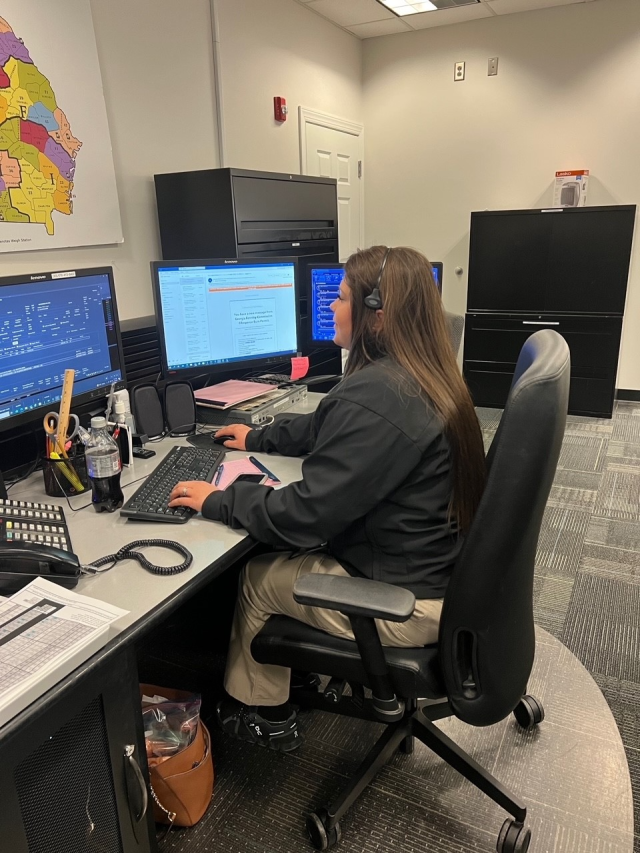
Hitchens said that since the death of Manuel Teran, a protester against the planned Atlanta Police Training Center who was allegedly shot by a Georgia trooper during a firefight on the forested property in 2023, and the sometimes violent public demonstrations that ensued, “that dynamic just got worse. For a long time with ‘Cop City,’ it was constant protest, and you know, that weighs on you.”
Munoz, who was patrolling with other local law enforcement on the perimeter of the training center site the day Teran died, said the public’s jaundiced view of that episode and other recent struggles between police and citizens that have gone viral on social media can be frustrating.
“I know that a lot of the narrative out there is not true at all,” he said. “There are millions and millions of police encounters every day. And those [violent] ones are fractions of a percent of incidents, and whether a trooper or officer responds the right way, it all boils down to compliance. If you just comply, you’re presumed innocent, you’ll have your chance to make your case, and the facts will come out. Don’t argue, don’t fight, don’t resist. We don’t want to fight you.”
Noting that he has a wife and four children he wants to come home to, Munoz said, “We’ve been pounded with de-escalation in training, and that’s what we practice. I’m sure there are officers out there now that freeze and that say, ‘Do I do my job? Or am I going to be put in prison, because I reacted in a certain way?’ So we do carry that, and it’s a heavy, heavy burden.”
Last year three House Democrats introduced House Bill 107, the Police Accountability Act, which proposes an end to qualified immunity for law enforcement officers and would have required body-worn cameras for all peace officers. The bill did not advance out of committee, but Hitchens said taken together with the public unrest and anti-police sentiment since 2020, it all had a demoralizing effect on his officers.
“All of these factors are forcing officers to become fatigued with our profession,” he said. “They feel that support is ending and the job is not worth the risk.”
According to the Georgia Peace Officers Training and Standards (POST) Council, the number of officers with basic council certifications in Georgia dropped to 5,956 in 2023 from 6,666 in 2017.
“I don’t think there’s a single law enforcement agency in Georgia that is fully staffed,” said Chris Harvey, deputy executive director of Georgia POST. “And they have a very hard time getting qualified people on board. … There just aren’t enough quality people that are interested in doing this job.”
While some agencies have raised salaries and added signing bonuses, he said, “I can tell you that it’s not a solved problem. Because I don’t think it’s primarily a money issue. I think it has a lot to do with the difficulty of doing this job these days. I’m not sure it’s ever been harder to work in law enforcement. The amount of scrutiny along with the amount of violence that police officers encounter on a regular basis, they generally feel like they’re out there alone. If they make one mistake, they’re gonna pay dearly for it. … It’s a tough sell.”
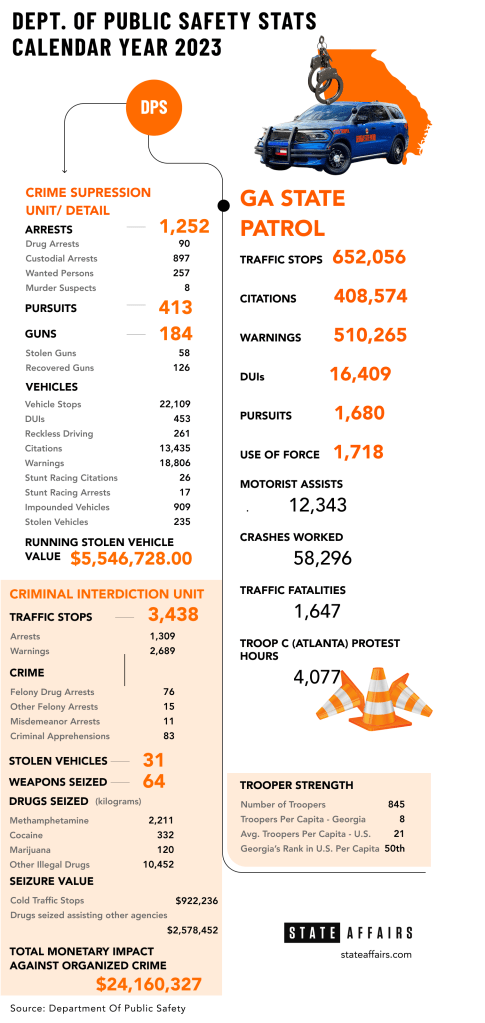

Father and son patrol leaders fight for trooper compensation
For Hitchens, his push to recruit potential state troopers and convince state leaders to increase pay and benefits for troopers is supported by an unlikely suspect — his dad.
House Appropriations public safety subcommittee chair Rep. Bill Hitchens, R- Rincon is a former trooper who served in the Georgia State Patrol for 28 years, and was later appointed by former Gov. Sonny Perdue to serve as public safety commissioner from 2004 to 2011. The elder Hitchens has served in the House since 2013.
At the House Working Group on Public Safety meeting last fall, Rep. Hitchens noted that the state patrol has maintained around 700 troopers since he joined in 1969, when the state population was about 4 million. “Now it’s 11 million people … and we have a lot more murders, stolen cars and merchandise,” the elder Hitchens said. “Where we fell down, I don’t know. It’s just we’ve never grown. … And now we’re at a breaking point.”
The younger Hitchens was appointed by Gov. Brian Kemp as deputy commissioner for public safety in 2020, and then as commissioner in 2023. As commissioner he oversees the Georgia State Patrol, the Motor Carrier Compliance Division, the Capitol Police Division, and other special law enforcement units, including the crime suppression, SWAT and canine teams.
The son and father team have successfully fought for substantial pay raises for troopers, whose salaries have increased over the past three legislative cycles by nearly $17,000. That includes a 4% cost of living increase and a $3,000 bonus for law enforcement officers approved by the General Assembly in the fiscal year 2025 budget. The starting salary for a new trooper will be $63,684 as of July 1, if the governor approves it in the budget, as expected.
Dispatchers will also get a boost in next year’s budget, with new pay step increases that can take them from a starting salary of $39,000 to up to $56,000 as they earn promotions.
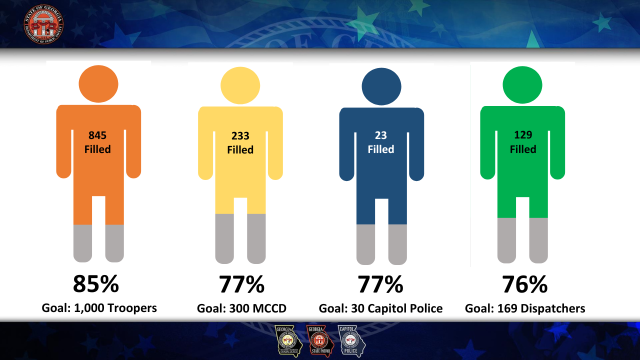
Col. Hitchens said those pay bumps seem to be turning the tide on recruitment. The number of applicants and graduates rose for the last few trooper schools held over the past year. Other changes the department made to trooper school requirements have also helped, including allowing people to go home more often during training, permitting access to mobile phones at night, and allowing people with arm tattoos to train and serve, if they cover them with long sleeves.
“We tried to make changes in training that we felt like really didn’t help people stay,” said Hitchens. “And we didn’t make it kinder or gentler. I mean, in this job that you sign up for, there’s got to be a certain level of discipline, there’s got to be a certain level of respect, with high physical training standards, that’s still there. But the things that we could change, we decided to do.”
Both men remain concerned about how to stem the trend of early retirement, and agree that sweetening the retirement package is the key way to combat it.
Currently most troopers qualify for a pension equal to 1% of their final pay for every year of service, and can also participate in a 401(K) savings plan while they serve, which the state matches up to 9%, depending on their number of years on the force. But Col. Hitchens is pushing for a more generous “defined benefit” retirement plan, with a 3% pension, which he said would double what most troopers get when they retire. Instead of earning about $25,000 a year on average, they would receive about $52,000.
Presently, the average tenure of a state trooper is 10 years, nowhere close to the 30-year careers Hitchens and other leaders want his officers to pursue.
And he knows it matters to them, as retirement benefits emerged as the number one retention issue on a recent agency-wide, anonymous survey.
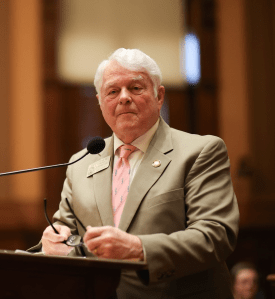

“Every other agency is increasing their hiring packages, raising pay and offering better benefits, from retirement to free health care,” Hitchens said, noting that the Atlanta and Sandy Springs police departments offer substantially higher pay and 3% defined benefit plans.
“We’re in a competitive bidding process, and we have to offer a reward that’s worth the risk our people are taking with their lives and liberty.”
The tenure of senior officers also matters because of the crucial role they play in mentoring new recruits.
“When we have our young troopers, the men and women that come into the field, they’re excited,” said Shackleford, the troop commander, who spent much of his 36-year public safety career in SWAT before taking over Troop K, which includes the crime suppression, criminal interdiction, K-9, SWAT and dive units. “They see the fast cars, they want to get into something. And the problem is, it’s just like a puppy. A puppy’s gonna get into something and make a mess. So we need the older ones to kind of calm them down and guide them a bit, show them how to see and assess a situation.”
Such role modeling of behavior, said Hitchens, “is very important, especially with de-escalation. A senior officer, having dealt with so much of that, has that confidence and the competence to carry out [their] job in a way that I think a lot of younger, less experienced officers don’t have yet. And that’s how you learn and morph over a career,” said Hitchens, adding that that transfer of knowledge and practice from veterans to recruits “benefits the public as well.”
Rep. Hitchens co-sponsored two bills related to bolstering retirement plans for law enforcement that passed out of the retirement committee during the last session. One passed in the House, but did not get a vote in the Senate. Other lawmakers balked at the cost.
Read these related stories:
Have questions or comments? Contact Jill Jordan Sieder on X @journalistajill or at [email protected]
And subscribe to State Affairs so you do not miss an update.
X @StateAffairsGA
Instagram @StateAffairsGA
Facebook @StateAffairsGA
LinkedIn @StateAffairs
